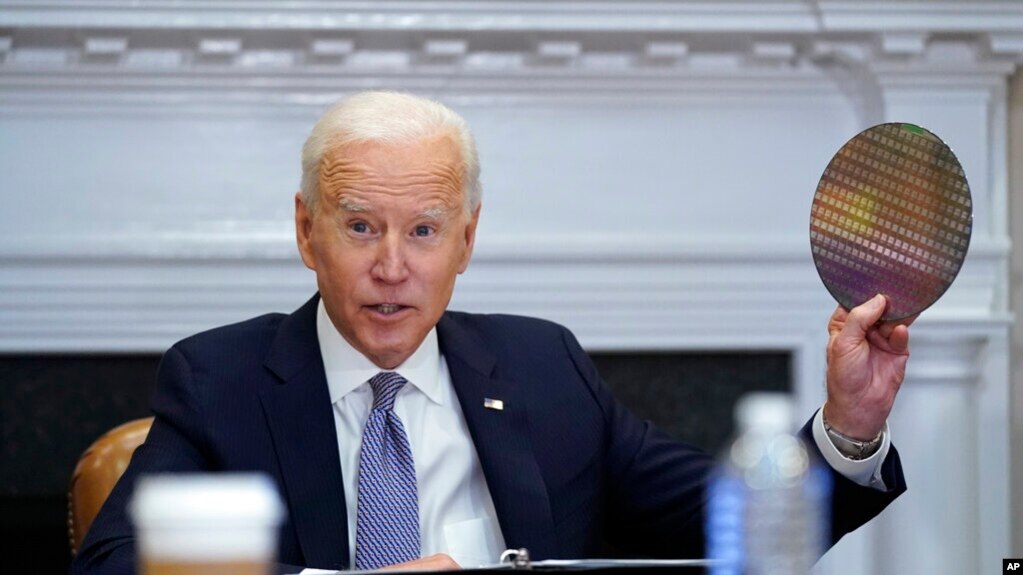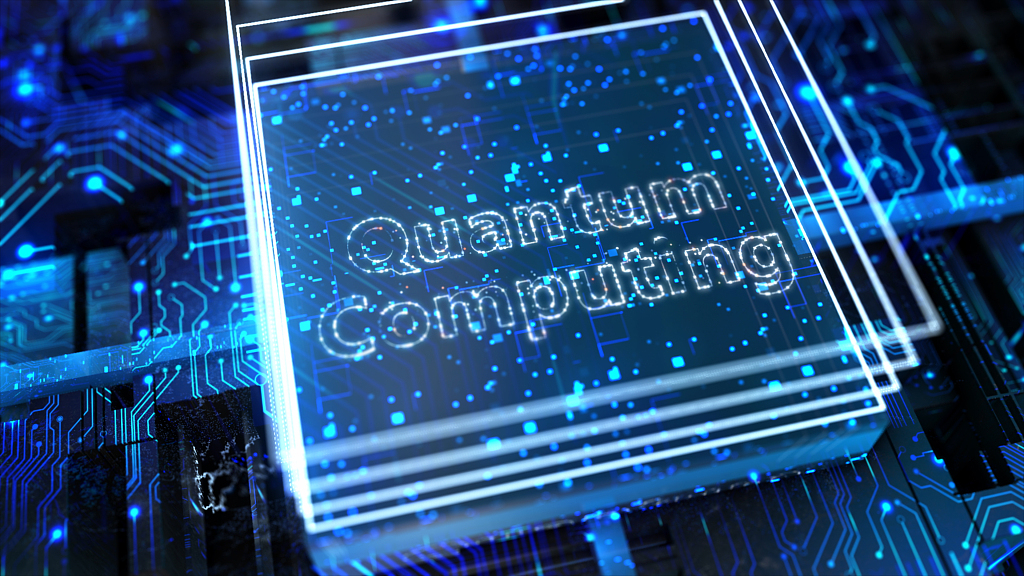
U.S. President Joe Biden holds up a silicon wafer as he participates virtually in the CEO Summit on Semiconductor and Supply Chain Resilience in the Roosevelt Room of the White House in Washington, DC, the U.S., April 12, 2021. /CFP
U.S. President Joe Biden holds up a silicon wafer as he participates virtually in the CEO Summit on Semiconductor and Supply Chain Resilience in the Roosevelt Room of the White House in Washington, DC, the U.S., April 12, 2021. /CFP
Editor's note: Anthony Moretti, a special commentator on current affairs for CGTN, is an associate professor at the Department of Communication and Organizational Leadership at Robert Morris University. The article reflects the author's opinions and not necessarily those of CGTN.
If U.S.-China relations take a significant step backward in the next few weeks, there will be only one person to blame: U.S. President Joe Biden, or one side: the United States of America.
On August 9, the president – declaring a national emergency (no subtlety at all there) – issued an executive order that will restrict certain investments that U.S. companies may make internationally. However much the president would like domestic and international audiences to think that his pronouncement truly covers the globe, remember that the only "country of concern" named was China.
Drilling down even more, restrictions will be placed on investments relating to semiconductors and other microelectronics, quantum information technologies and AI. To put it bluntly, the president believes his order will halt, or at least slow down, China's ability to further enhance its military. And make no mistake, the White House and the Department of Defense are "freaking out" about any potential military challenge posed by China.
Those words – "freaking out" – are in quotes because they were used in the headline of a recent Politico Magazine report. The article notes that U.S. elites are finally coming to accept that "we are hugely behind the curve," as one person told Politico, in understanding what a war in East Asia that involves the U.S. and China might look like. On top of that, the White House also recognizes that the billions upon billions of dollars in weapons that have been given to Ukraine over the past roughly 18 months have weakened America's overall military strength. Finally, American officials admit that not enough has been done over the past two decades to maintain a necessary stockpile of arms.
How ironic that the country that will spend more than $800 billion in 2023 on defense cannot figure out what is needed to truly protect the country and support its allies. Therefore, it is relevant to ask whether the president's "national emergency" is actually a recognition that the U.S. military is out of whack, and the president knows he will be blistered by Republicans because of it in the run up to next year's election. The perception that Biden, already criticized for at times being seemingly physically frail, would be labeled weak in confronting China could become a rallying point for whoever the Republican Party's presidential nominee is in 2024. Perhaps the "national emergency" is really "Biden's emergency?"
The only good news emanating from the White House is that the order will not go into immediate effect. Over the next 45 days, the Biden administration will seek input from various stakeholders before determining the exact restrictions. Yet the virulent anti-China climate in the U.S. means that corporations seeking to protect their financial bottom lines are likely to run into significant headwinds as they make their case.

Nevertheless, there should be at least two members of Biden's Cabinet who will urge caution. One is U.S. Commerce Secretary Gina Raimondo. Just last month, she said that any effort to limit free trade – something the U.S. holds sacrosanct – with China will have negative repercussions if "the cutline [is] to be so broad that you deny American companies revenue and China can get the products elsewhere." Next, U.S. Treasury Secretary Janet Yellen, who has consistently sought to be the adult in a room full of elected and appointed political officials who insist China is out to get the U.S., should have something to say. Keep in mind what she said during her visit in July to Beijing: "We believe that the world is big enough for both of our countries to thrive. Both nations have an obligation to responsibly manage this relationship: to find a way to live together and share in global prosperity."
Of course, it will be her boss who must be challenged to explain how his executive order can square with seeking to have "both of our countries thrive." And it is increasingly difficult to believe that the White House has any interest in seeing China do anything but suffer.
The executive order is one of many efforts the Biden administration, often joined at the hip by Congress, has made to bring pain to China. The CHIPS and Science Act, rolled out one year ago, is perhaps the most recognizable legislative effort. The White House maintains that the act will create jobs in America, ensure global supply chains are strengthened and – here it comes – "counter China." The Washington Post examined one claim made by the president – that one million construction jobs would be created because of the CHIPS and Science Act – and called it "bogus." One can hope that the media will continue to scrutinize the White House's claims.
America's relationship with China had been moving forward in recent weeks. Visits by multiple American officials did not resolve any of the differences between the two nations, but they did demonstrate the need to talk. Biden's executive order could bring that momentum to a halt.
(If you want to contribute and have specific expertise, please contact us at opinions@cgtn.com. Follow on Twitter to discover the latest commentaries in the CGTN Opinion Section.)